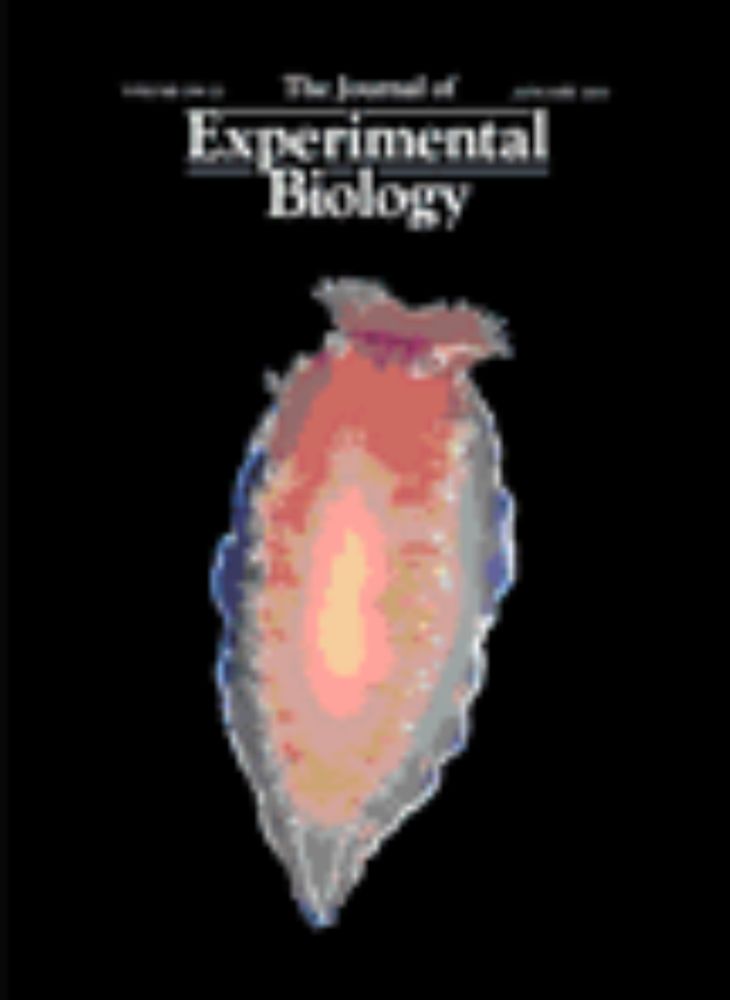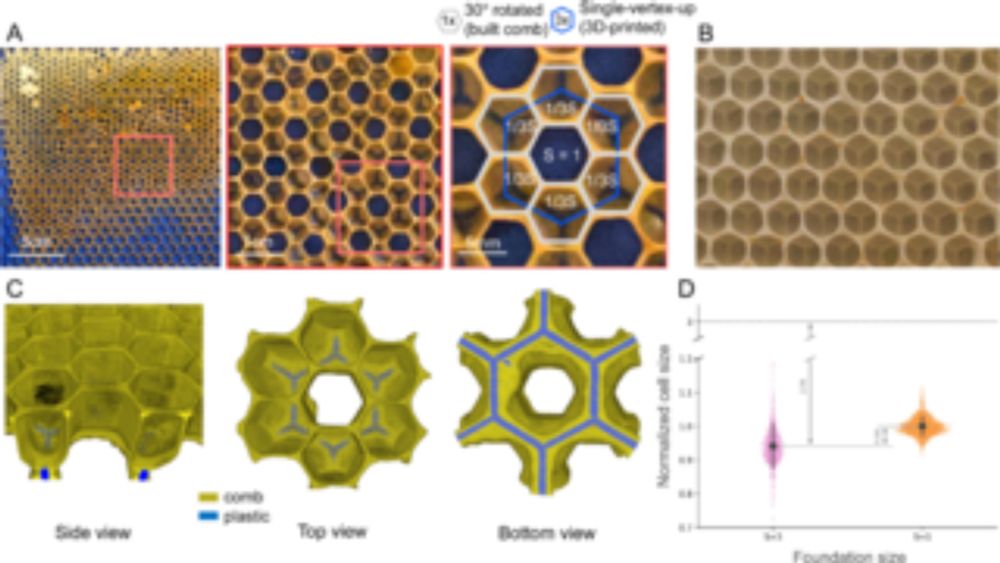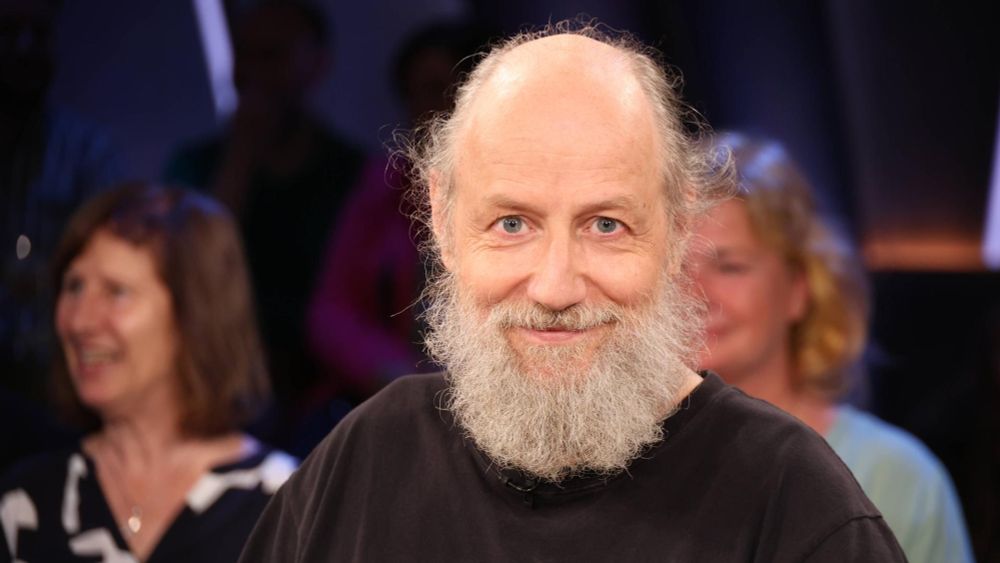
Lars Chittka
@larschittka.bsky.social
Lars Chittka, Professor of Sensory and Behavioural Ecology and author of The Mind of a Bee
Interesting title that... journals.biologists.com/jeb/article-...

Auditory encoding during the last moment of a moth's life
SUMMARY. The simple auditory system of noctuoid moths has long been a model for anti-predator studies in neuroethology, although these ears have rarely been experimentally stimulated by the sounds the...
journals.biologists.com
November 10, 2025 at 6:44 PM
Interesting title that... journals.biologists.com/jeb/article-...
We have a PhD student opening for Insect Cognition via the CSC (Chinese citizens only in this case - deadline January 28) - please pass on to anyone who might be interested and qualified: www.qmul.ac.uk/sbbs/postgra...

November 7, 2025 at 6:47 PM
We have a PhD student opening for Insect Cognition via the CSC (Chinese citizens only in this case - deadline January 28) - please pass on to anyone who might be interested and qualified: www.qmul.ac.uk/sbbs/postgra...
Looking forward to giving a presentation at the Matthaei Botanical Gardens Auditorium in Ann Arbor next week

November 7, 2025 at 2:58 PM
Looking forward to giving a presentation at the Matthaei Botanical Gardens Auditorium in Ann Arbor next week
Reposted by Lars Chittka
in Italian: Do insects feel pain? www.ilpost.it/2025/10/13/i... it covers also @preparedmindslab.bsky.social work in collaboration with @larschittka.bsky.social
www.pnas.org/doi/abs/10.1... , www.cell.com/iscience/ful...
www.pnas.org/doi/abs/10.1... , www.cell.com/iscience/ful...

Gli insetti provano dolore? - Il Post
È una possibilità sempre più indagata dalla ricerca e che potrebbe cambiare in modo fondamentale il nostro rapporto con loro
www.ilpost.it
October 29, 2025 at 8:29 AM
in Italian: Do insects feel pain? www.ilpost.it/2025/10/13/i... it covers also @preparedmindslab.bsky.social work in collaboration with @larschittka.bsky.social
www.pnas.org/doi/abs/10.1... , www.cell.com/iscience/ful...
www.pnas.org/doi/abs/10.1... , www.cell.com/iscience/ful...
Happy to give a presentation in such illustrious company at the 3rd International Conference on Bee Health at the Fujian Agriculture and Forestry University in Fuzhou, China this coming week


October 26, 2025 at 1:35 PM
Happy to give a presentation in such illustrious company at the 3rd International Conference on Bee Health at the Fujian Agriculture and Forestry University in Fuzhou, China this coming week
Exciting new work from former team members Eric Romero, Cwyn Solvi, Fei Peng and colleagues makes the cover of Science: affective contagion in bumblebees! www.science.org/doi/10.1126/...

October 24, 2025 at 6:13 AM
Exciting new work from former team members Eric Romero, Cwyn Solvi, Fei Peng and colleagues makes the cover of Science: affective contagion in bumblebees! www.science.org/doi/10.1126/...
A few of my ideas on PhD student training
Encouraging independence, creativity and diversity helps supervisors shape future leaders and spark breakthroughs. www.timeshighereducation.com/campus/how-t... #Academia #HigherEd #AcademicChatter #AcademicSky #PhDsky @qmul.bsky.social @larschittka.bsky.social

How to train PhD Jedi
Training PhD students is less about supervision and more about empowerment. By fostering independence, creativity and diversity, supervisors can nurture the next generation of scientific leaders, and ...
www.timeshighereducation.com
October 9, 2025 at 12:22 PM
A few of my ideas on PhD student training
Coming soon: Response-specific behavioral plasticity in habituation triggered by repeated visual looming stimuli in foraging bumblebees (Bombus terrestris), by Dissegna, Andrea Chittka, Lars and Chiandetti, Cinzia psycnet.apa.org/record/2026-...
APA PsycNet
psycnet.apa.org
October 7, 2025 at 4:20 PM
Coming soon: Response-specific behavioral plasticity in habituation triggered by repeated visual looming stimuli in foraging bumblebees (Bombus terrestris), by Dissegna, Andrea Chittka, Lars and Chiandetti, Cinzia psycnet.apa.org/record/2026-...
Reposted by Lars Chittka
At our launching event "Mind, Tech, and Wellbeing" for our new Research Centre for Brain and Behaviour at QMUL! Follow us on here @queenmarycbb.bsky.social to hear more about our research
@qmul.bsky.social @larschittka.bsky.social
@qmul.bsky.social @larschittka.bsky.social

September 29, 2025 at 2:42 PM
At our launching event "Mind, Tech, and Wellbeing" for our new Research Centre for Brain and Behaviour at QMUL! Follow us on here @queenmarycbb.bsky.social to hear more about our research
@qmul.bsky.social @larschittka.bsky.social
@qmul.bsky.social @larschittka.bsky.social
Reposted by Lars Chittka
Insect spatial memory is thought to be based on panoramic snapshots that are modelled as retinotopic images. This idea won't allow a distinction of landmarks from the scene. Unexpectedly, our data suggest that 🐝 learn 3D-objects as individual landmarks. #neuroethology
www.biorxiv.org/content/10.1...
www.biorxiv.org/content/10.1...
September 28, 2025 at 10:54 AM
Insect spatial memory is thought to be based on panoramic snapshots that are modelled as retinotopic images. This idea won't allow a distinction of landmarks from the scene. Unexpectedly, our data suggest that 🐝 learn 3D-objects as individual landmarks. #neuroethology
www.biorxiv.org/content/10.1...
www.biorxiv.org/content/10.1...
Reposted by Lars Chittka
Nature book challenge. A book per day in no particular order, until you've shared ALL of the best nature books in your personal library. No explanations, no reviews.
#Books #Nature #Naturewriting #naturebooks #conservation #naturebookchallenge #booksky
#bees #bumblebees
#NatureBookChallenge
#Books #Nature #Naturewriting #naturebooks #conservation #naturebookchallenge #booksky
#bees #bumblebees
#NatureBookChallenge

September 20, 2025 at 6:44 PM
Nature book challenge. A book per day in no particular order, until you've shared ALL of the best nature books in your personal library. No explanations, no reviews.
#Books #Nature #Naturewriting #naturebooks #conservation #naturebookchallenge #booksky
#bees #bumblebees
#NatureBookChallenge
#Books #Nature #Naturewriting #naturebooks #conservation #naturebookchallenge #booksky
#bees #bumblebees
#NatureBookChallenge
When bees carry individual marks, you realise that they are not "attracted to flowers" like some silly reflex machines - in fact they know where they're going and the same individuals often return to the same flowers whose locations, appearance and rewards they have learned. Go Orange 24!
September 19, 2025 at 9:31 AM
When bees carry individual marks, you realise that they are not "attracted to flowers" like some silly reflex machines - in fact they know where they're going and the same individuals often return to the same flowers whose locations, appearance and rewards they have learned. Go Orange 24!
Reposted by Lars Chittka
Very proud of this extremely collaborative piece: academic.oup.com/mbe/article/...
Here, we show that divergence in visual systems - in response to differences in the light environment - leads to rapid divergence in sexually selected colour traits. Work brilliantly led by Madeleine Carruthers. 🐟👀🎨
Here, we show that divergence in visual systems - in response to differences in the light environment - leads to rapid divergence in sexually selected colour traits. Work brilliantly led by Madeleine Carruthers. 🐟👀🎨

Rapid Divergence of Visual Systems and Signaling Traits to Contrasting Light Regimes During Early Speciation of African Crater Lake Cichlid Fish
Abstract. Sensory adaptation is widely hypothesized to drive ecological speciation, yet empirical evidence from natural populations undergoing early stage
academic.oup.com
September 16, 2025 at 4:23 PM
Very proud of this extremely collaborative piece: academic.oup.com/mbe/article/...
Here, we show that divergence in visual systems - in response to differences in the light environment - leads to rapid divergence in sexually selected colour traits. Work brilliantly led by Madeleine Carruthers. 🐟👀🎨
Here, we show that divergence in visual systems - in response to differences in the light environment - leads to rapid divergence in sexually selected colour traits. Work brilliantly led by Madeleine Carruthers. 🐟👀🎨
Reposted by Lars Chittka
Come and work with us! Three new academic posts (including Animal Behaviour) and superb facilities in the new Life & Mind Building
Oxford Biology is growing 📢
We’re appointing 3 Associate Professors in:
🌱 Plant Sciences
🦉 Animal Behaviour
🔬 Molecular Cell Biology
3 fields. 3 opportunities. One new home for Oxford Biology.
Learn more 👉 bit.ly/41S2Tc7
Apply now 👉 bit.ly/488CNW3
We’re appointing 3 Associate Professors in:
🌱 Plant Sciences
🦉 Animal Behaviour
🔬 Molecular Cell Biology
3 fields. 3 opportunities. One new home for Oxford Biology.
Learn more 👉 bit.ly/41S2Tc7
Apply now 👉 bit.ly/488CNW3

September 15, 2025 at 12:54 PM
Come and work with us! Three new academic posts (including Animal Behaviour) and superb facilities in the new Life & Mind Building
Reposted by Lars Chittka
🆕 Lars Chittka in der Sendung „Im Gespräch“, Deutschlandfunk Kultur:
www.deutschlandfunkkultur.de/bienenforsch...
www.deutschlandfunkkultur.de/bienenforsch...

Bienenforscher Lars Chittka - Denkende Bienen und spielende Hummeln
Bienen und Hummeln sind ganz schön schlau. So hat Bienenforscher Lars Chittka herausgefunden, dass diese Insekten zählen und spielen können.
www.deutschlandfunkkultur.de
September 4, 2025 at 12:54 PM
🆕 Lars Chittka in der Sendung „Im Gespräch“, Deutschlandfunk Kultur:
www.deutschlandfunkkultur.de/bienenforsch...
www.deutschlandfunkkultur.de/bienenforsch...
New paper on male bumblebee spatial movement strategies: www.biorxiv.org/content/10.1...

Male bumblebees adapt foraging to environmental conditions to sustain mate-seeking efforts
Male bees navigate complex trade-offs between energy acquisition and reproductive signalling, yet their movement strategies remain understudied. Unlike workers that optimise foraging to support the co...
www.biorxiv.org
September 12, 2025 at 11:29 AM
New paper on male bumblebee spatial movement strategies: www.biorxiv.org/content/10.1...
It was a pleasure handing this exciting study as editor for PLOS Biology: journals.plos.org/plosbiology/...

Honeybees adapt to a range of comb cell sizes by merging, tilting, and layering their construction
Honeybees often need to build their comb under conditions that prevent a regular hexagonal lattice. This study uses 3D printed panels and X-ray microscopy to explore their adaptive process when differ...
journals.plos.org
September 9, 2025 at 7:49 PM
It was a pleasure handing this exciting study as editor for PLOS Biology: journals.plos.org/plosbiology/...
Ein Interview letzte Woche im Deutschlandfunk www.deutschlandfunkkultur.de/bienenforsch...

Bienenforscher Lars Chittka - Denkende Bienen und spielende Hummeln
Bienen und Hummeln sind ganz schön schlau. So hat Bienenforscher Lars Chittka herausgefunden, dass diese Insekten zählen und spielen können.
www.deutschlandfunkkultur.de
September 7, 2025 at 10:36 AM
Ein Interview letzte Woche im Deutschlandfunk www.deutschlandfunkkultur.de/bienenforsch...
Reposted by Lars Chittka
Queen Mary is delighted to be a ‘University of the Year’ finalist in the #THEAwards!
And we're so proud Professors @larschittka.bsky.social and @alastairhackney.bsky.social have been shortlisted for Outstanding Research Supervisor of the Year. @timeshighered.bsky.social
tinyurl.com/ebe8yx23
And we're so proud Professors @larschittka.bsky.social and @alastairhackney.bsky.social have been shortlisted for Outstanding Research Supervisor of the Year. @timeshighered.bsky.social
tinyurl.com/ebe8yx23

September 4, 2025 at 3:48 PM
Queen Mary is delighted to be a ‘University of the Year’ finalist in the #THEAwards!
And we're so proud Professors @larschittka.bsky.social and @alastairhackney.bsky.social have been shortlisted for Outstanding Research Supervisor of the Year. @timeshighered.bsky.social
tinyurl.com/ebe8yx23
And we're so proud Professors @larschittka.bsky.social and @alastairhackney.bsky.social have been shortlisted for Outstanding Research Supervisor of the Year. @timeshighered.bsky.social
tinyurl.com/ebe8yx23
Reposted by Lars Chittka
Schönes, informatives Gespräch mit @larschittka.bsky.social im DLF über die Klugheit von Bienen etc.
Es bestärkt, dass ich Wespen seit Jahren m lokalem Biohonig od Obst füttere. Sie sind wirkl handzahm, man kann sie streicheln ohne gestochen zu werden.
www.deutschlandfunkkultur.de/bienenforsch...
Es bestärkt, dass ich Wespen seit Jahren m lokalem Biohonig od Obst füttere. Sie sind wirkl handzahm, man kann sie streicheln ohne gestochen zu werden.
www.deutschlandfunkkultur.de/bienenforsch...

Bienenforscher Lars Chittka - Denkende Bienen und spielende Hummeln
Bienen und Hummeln sind ganz schön schlau. So hat Bienenforscher Lars Chittka herausgefunden, dass diese Insekten zählen und spielen können.
www.deutschlandfunkkultur.de
September 4, 2025 at 2:51 PM
Schönes, informatives Gespräch mit @larschittka.bsky.social im DLF über die Klugheit von Bienen etc.
Es bestärkt, dass ich Wespen seit Jahren m lokalem Biohonig od Obst füttere. Sie sind wirkl handzahm, man kann sie streicheln ohne gestochen zu werden.
www.deutschlandfunkkultur.de/bienenforsch...
Es bestärkt, dass ich Wespen seit Jahren m lokalem Biohonig od Obst füttere. Sie sind wirkl handzahm, man kann sie streicheln ohne gestochen zu werden.
www.deutschlandfunkkultur.de/bienenforsch...
Super happy to be on the shortlist for Outstanding Research Supervisor of the Year by the Times Higher Education's "Oscars of higher education": the-awards.co.uk/2025/en/page...

September 4, 2025 at 7:42 AM
Super happy to be on the shortlist for Outstanding Research Supervisor of the Year by the Times Higher Education's "Oscars of higher education": the-awards.co.uk/2025/en/page...
Morgen in der Eifel! www.lit-eifel.de/programm-202...

September 3, 2025 at 8:45 PM
Morgen in der Eifel! www.lit-eifel.de/programm-202...
I was super excited to receive this award! Thank you so much!
Big time congrats to @larschittka.bsky.social on receiving the Exemplar Award this year! Lars and his team has discovered several previously unimaginable cognitive capacities in the itty bitty brains of bees giving us new insights into the evolution of learning.
chittkalab.sbcs.qmul.ac.uk
chittkalab.sbcs.qmul.ac.uk

August 27, 2025 at 6:18 PM
I was super excited to receive this award! Thank you so much!
The French version of The Mind of a Bee is now available- 13 translations already! 😊

August 23, 2025 at 12:26 PM
The French version of The Mind of a Bee is now available- 13 translations already! 😊
Reposted by Lars Chittka
How do flies keep crystal-clear vision while zipping through the air? 🪰
This study reveals synaptic high-frequency jumping, a mechanism where photoreceptor synapses recode vision into high-frequency signals, enabling synchronised, coherent perception even at lightning speed. #vision #neuroscience
This study reveals synaptic high-frequency jumping, a mechanism where photoreceptor synapses recode vision into high-frequency signals, enabling synchronised, coherent perception even at lightning speed. #vision #neuroscience
Flies keep their vision razor-sharp even at top speed: we found their synapses “jump” into higher frequencies during saccades, wiping out delays and boosting acuity. This self-sharpening trick shows how brains sync perception with rapid behaviour.
www.biorxiv.org/content/10.1...
www.biorxiv.org/content/10.1...

Synaptic high-frequency jumping synchronises vision to high-speed behaviour
During high-speed behaviour, animals must predict, detect, process, and respond synchronously to rapid environmental changes, including those caused by their own movements. How neural systems achieve ...
www.biorxiv.org
August 22, 2025 at 10:30 AM
How do flies keep crystal-clear vision while zipping through the air? 🪰
This study reveals synaptic high-frequency jumping, a mechanism where photoreceptor synapses recode vision into high-frequency signals, enabling synchronised, coherent perception even at lightning speed. #vision #neuroscience
This study reveals synaptic high-frequency jumping, a mechanism where photoreceptor synapses recode vision into high-frequency signals, enabling synchronised, coherent perception even at lightning speed. #vision #neuroscience

